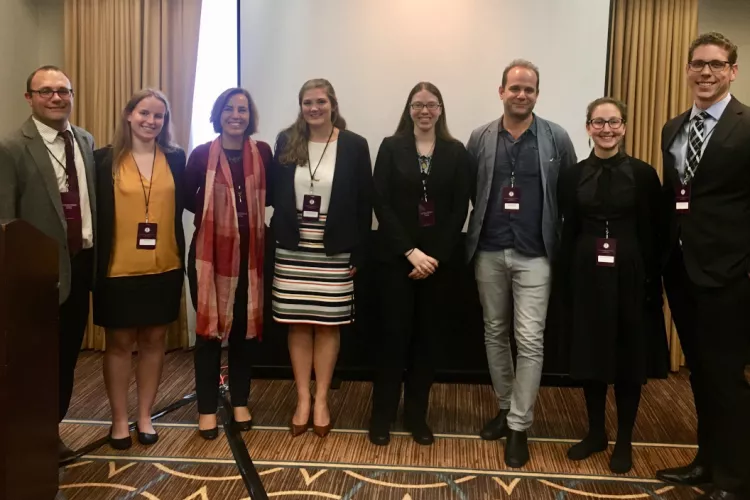Karina Cooper ’20 and Rebecca Posner-Hess ’21 Present at Classics Conference

Karina Cooper ’20 (fourth from right), Rebecca Posner-Hess ’21 (second from right), and Associate Professor of Classics Jeremy Lefkowitz (third from right) at the conference of the Classical Association of the Atlantic States.
Karina Cooper ’20 and Rebecca Posner-Hess ’21 recently presented papers at the conference of the Classical Association of the Atlantic States (CAAS).
Exchanging perspectives with attendees from an array of backgrounds, including primary school teachers, the students delighted in the vibrancy and range of their field.
“Everyone came together to share their love of ancient languages and cultures, and presented new ways to engage with centuries-old texts and find their relevance to resonate with the world we live in today,” says Cooper, an honors Latin major from Seattle, Wash.
“It was a clear example that Latin and Greek are by no means dead languages,” she adds, “and that more than ever there are lessons to be learned from the classics.”
Cooper presented “Serpents and Snakes in the Fable Collection of Romulus Anglicus Cuncti.” Posner-Hess, an honors Greek major from Chapel Hill, N.C., presented “Weaving, Writing, and the Metamorphoses of Ovid’s Female Voices.”
The original papers, written for Latin classes at Swarthmore, were chosen through a peer-reviewed process. The students sent in anonymous abstracts last spring, advised by Associate Professor of Classics Jeremy Lefkowitz.
Cooper and Posner-Hess presented their papers on the conference’s only undergraduate panel, and drew praise.
“Both students were well-prepared to give thoughtful response to the questions posed by the audience and presiders,” Ann R. Raia, chair of the panel and professor emerita at the College of New Rochelle, wrote to Lefkowitz. “There is no way you could overstate how impressed we were with your two students’ intelligent work and composed delivery.”
The conference gave the students the chance to gauge their progress and intellectual growth, which can be difficult while deeply engaged in coursework. They were also able to broaden their networks and engage in “an enlarged community of learning and knowledge production so vital to the production of scholarship,” notes Lefkowitz.
That knowledge production included genuine and meaningful reflection on the field of classics’ place in contemporary culture and difficult topics such as “its historical complicity in racist and misogynistic ideologies,” he adds.
“It was thrilling, really, to witness and participate in conversations on these challenging topics with Swarthmore students,” Lefkowitz says. “It’s been a long time coming—confronting these problems openly and directly.”
Swarthmore is investing in its vibrant intellectual culture. Learn how at lifechanging.swarthmore.edu.



